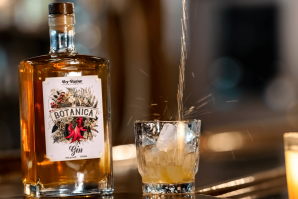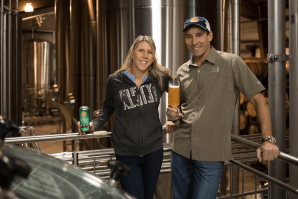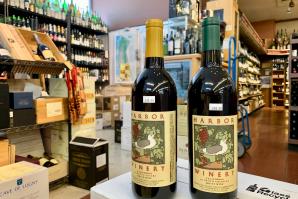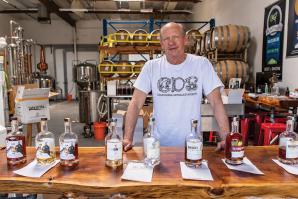Melanie Shelby steps through downtown’s blinding sunlight and into its shadowy shrine to the ancient agave. The restaurant is called Mayahuel. It’s cool and cavernous on this sweltering summer afternoon. The place takes its name from the Aztec goddess of agave, and as Shelby strolls in, she passes two of the plants positioned like studded sword-bundles above the candlelit tables. She pauses at the bar, which is famous for its tequila and mezcal collection.
One of the bottles that Mayahuel is proudly displaying these days is Shelby’s own distilled agave juice, Enelalma, a name that comes from the Spanish term for “in the soul” and embodies Shelby’s belief drinking great tequila is a spiritual experience.
After signaling she’s headed for the back, Shelby moves beyond a pair of brown curtains into a room adorned with striking, jewel-colored murals. A decade ago, Mayahuel’s owner, Ernesto Delgado, started explaining the meaning of these images to Shelby: He was recounting a collective story they tell about the vital force agave has been in the culture of his homeland.
Delgado couldn’t have known that the style of his establishment and his keen insights on those murals would help spur Shelby into an obsession with the art of tequila-making, as well as a meditation on the parallels between African American and Mexican battles for freedom over the centuries.
The immersion into craft and the past that began at Mayahuel led Shelby to evolve from political rainmaker to budding producer of fine spirits — and a businesswoman determined to share premium tequila with the Black community.
But while the trajectory may have started here at 12th and K, it was years later when Shelby glimpsed a father interacting with his daughter in Jesus Maria, Mexico, that the puzzle finally came together for how she’d bring Enelalma to the masses.
Today, Shelby’s brand is being sold in 42 stores and restaurants across the region. Enelalma may be introducing non-Spanish speakers to a new phrase for the soul, but Shelby says it’s the odyssey itself to make the tequila that has really been speaking to her own soul.
Melanie Shelby and her master distiller, Oscar Vazquez Camarena,
walk through an agave field in the highlands of Los Altos in
Mexico. (Courtesy photograph)

Heading south
Shelby can’t remember a time when campaign canvassing and stuffing envelopes were not part of her family life. Her father, James Shelby, began his career working for the Parks Department in North Highlands and serving on the Sacramento County Fire Board before becoming a foundational player in the 1996 drive to incorporate the city of Citrus Heights. James Shelby served on Citrus Heights’ first city council and held three terms as its mayor (he was the first African American to be mayor in Citrus Heights). James was also the president of the Greater Sacramento Urban League for 25 years.
Shelby had politics in her blood from a young age.
She wasn’t the only one. Shelby attended Winston Churchill Middle School in Carmichael, where she was classmates with state assemblyman and current Sacramento mayoral candidate Kevin McCarty and California Attorney General Rob Bonta. All three of the kids would grow up to work around the state Capitol. Over the years, Shelby used her communication savvy and political IQ to build a successful lobbying firm that specialized in the energy industry. It was while working on some legislation in 2011 that another political dealer first introduced Shelby to Mayahuel and its elegant style of tequila-tasting.
Shelby was reluctant to go because the last time she’d had tequila, 15 years prior, she’d woken up extremely ill.
“And I’d sworn that I’d never drink tequila again,” Shelby stresses. “He told me, ‘We’re going to sip it out of a champagne flute. I promise, it’s going to change your mind.’ And it literally changed my mind.”
Shelby became a regular at Mayahuel while developing her palette for tequilas from different parts of Mexico. She also learned that, in terms of distilled agave, tequila is a subcategory under the much broader umbrella of mezcal, one that’s only made with the Blue Weber species of the plant and produced in the state of Jalisco. As she got more interested, Delgado started walking her through the murals that he’d brought to the restaurant. Shelby had an epiphany that tequila is more than drink, but an age-old human story that begins with the Aztecs fermenting agave into pulque thousands of years ago and distilling it beginning in the 18th century, carrying through to the crop’s importance to a newly independent Mexico.
“I thought, ‘How is it that I missed all of this?’” Shelby recalls of the images. “These murals speak to the beautiful, rich agave spirit and how it brings and provides life. It’s the story of a culture, and of something coming from the earth.”
Shelby began dreaming of her own tequila brand that honored Mexican traditions but also appealed to non-traditional drinkers. The idea might have stayed just that — a dream — had it not been for the pandemic. During 2020’s COVID chaos, Shelby’s lobbying business lost most of its clients overnight. That’s when she made the decision to take her life in a whole new direction.
Melanie Shelby drinks a glass of her tequila, Enelalma, inside
Mayahuel in Downtown Sacramento. The restaurant’s murals played a
role in how Shelby came to understand the history of tequila.
(Photograph by Scott Thomas Anderson)

The quest to create Enelalma started with Shelby touring the Mexican state of Jalisco with an agave spirits expert named Valerie Saucedo. Shelby was doing blind taste-testing to see what region of agave farms spoke most to her sensibilities. Saucedo helped Shelby understand that she needed to make her product in the highlands of Los Altos de Jalisco, or the Jalisco Highlands. During Shelby’s treks below the border, she also met Oscar Vazquez Camarena, a master distiller who had just become a free agent in the industry. Shelby recruited Camarena to be the artisan behind her tequila, but she still needed the right distillery in Los Altos for Camarena to work his magic in.
While visiting a small, family-owned operation in the town of Jesus Maria, Shelby found a place that spoke to her own childhood. She’d gone into a distillery owned by Porfirio Garcia and noticed him tutoring his then-14-year-old daughter Julie on the nuances of the agave trade. Porfirio didn’t just have Julie there to be his translator; rather, he was sharing his life’s passion with her. Shelby was hit by a flood of memories of her own father stewarding her through the ins and outs of civic government when she was the same age.
“I saw myself,” Shelby remembers. “He was teaching his daughter the business; and it literally took me back to running around at political events with my dad. And there was something in that that was just a strange human connection.”
Enelalma
Shelby’s first product from Enelalma — an additive-free blanco tequila – hit bars and stores in the Capital Region in January. She’s since been perfecting an añejo that’s aged in used Jack Daniels whiskey barrels, which is due for release in 2025.
These days, spirit fans aren’t just tasting Enelalma at Mayahuel, but everywhere from Camden Spit & Larder on the Capitol Mall to Sienna in East Roseville. Shelby has also been hosting tasting and pairing events at restaurants that include Ella and Hyatt’s 7th Street Standard at the Downtown Centric.
At each of these events, Shelby has emphasized that everything about Enelalma, from the crystal-cut look of its bottle design with evocative emblems to its consultants and marketing team, involve companies that are either owned by a woman, a person of color, a small business owner or a family business. She’s also told the gathered tequila-tasters that she hopes her brand will inspire people to dwell on the similarities between Juneteenth — a holiday rooted in 250,000 slaves in Texas being declared free at the end of the Civil War — to the celebrations that broke out across Mexico when it was liberated from Spanish rule in 1821.
Last week, as Shelby was contemplating her next tequila night, she learned that Enelalma would be distributed by 20 different Total Wine locations across the West. It’s a milestone for the brand; though Shelby acknowledges she couldn’t have reached it without early support from her favorite independent wine and spirits sellers in the region. She says her biggest champions on that front have been Ro Nayyar, owner of Roco Wine & Spirits in West Sacramento, and Lori Alaniz, owner of Sheldon Wine Shop.
“I’ve been carrying Enelalma for over four or five months now and it’s done really, really well,” Alaniz observes. “Being that it’s a female-owned business and a minority-owned business, that’s huge for starting a conversation and promoting it. It’s also just a phenomenal product. I carry a lot of additive-free tequilas, and this one really stands up with all of them.”
She adds, “It’s a beautiful bottle with beautiful packaging, so it makes a great gift for a tequila-lover.”
With distribution expanding, Shelby has been thinking of hosting a future event at Mayahuel, the place where her long and unexpected journey began. Its murals alone make for the perfect setting to explain how specific her inspiration is.
“For me, the story of Enelalma is a story about those similarities in cultures,” Shelby notes. “Especially in our rich heritage and legacy of overcoming. I think there is commonality, comradery, brotherhood and connection in talking about our struggle.”
–
Subscribe to the Comstock’s newsletter today.
Recommended For You

Luscious Libations
Distilleries use local, natural flavors to enhance their creations
Whether in Sacramento or the upper climbs of the Gold Country, craft distillers are ready to give the drinking public a taste of all of the possibilities within libation.

FiftyFifty Brewing Brings 100 Percent
Truckee brewers pioneer craft beer in the high country
Though quality breweries are cropping up between Donner’s Pass and South Lake Tahoe, the first to drive its stakes in the snow — and the one that’s now shipping beer across the world — is FiftyFifty.

A Man on a Wine Mission
Remembering Charles Myers, winemaker of West Sacramento’s Harbor Winery
In 1968, a lone vintner set out to prove the region’s surviving mission grapes were still marketable. He was in a race against time: Most of the landmark roots were being torn out during that epoch, their soil swapped for better commercial farming options. The late Charles Myers set off a chain of events that would ultimately launch Amador County onto the global wine market.

These Craft Distilleries Are Bringing Housemade Whiskeys to the Capital Region
The Capital Region craft distillery scene is starting to catch up with the rest of the country.



